

Did you know that the most popular college major isn’t what you think it is? As educational landscapes shift, surprising trends in higher education are emerging, redefining the skills students prioritize.
In today's rapidly changing world, students are flocking to unexpected courses that promise future-proof careers. Understanding these trends is crucial for anyone looking to stay ahead. Let’s explore why this unexpected shift is more important now than ever before.
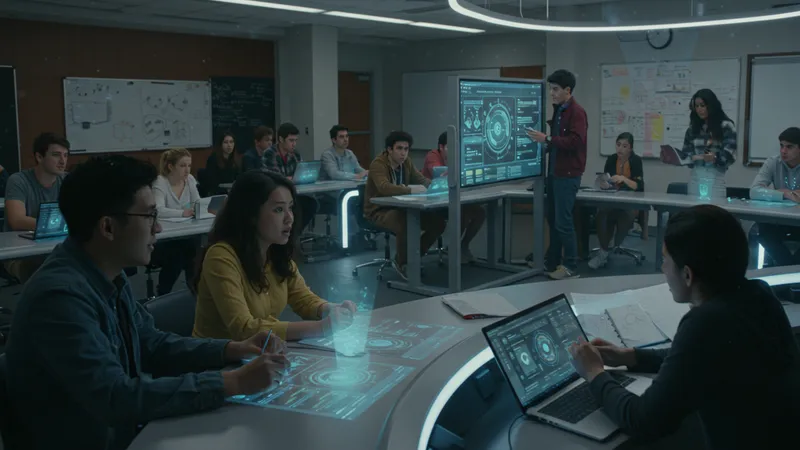
Surprisingly, while traditional fields like engineering and medicine remain popular, there's a surge in interest towards niche subjects like ethno-botany and digital humanities. These courses don't just fill a syllabus—they open doors to unexpected career paths and innovations. But that’s not even the wildest part...
An astounding number of students are also opting for coursework that transcends geographical boundaries, tapping into global education online. Digital education platforms have been embraced more than ever, yet they come with their own set of challenges and advantages. But the real surprise is yet to come…
What happens next shocked even the experts—students are defying conventional education models, paving the way for unprecedented educational experiences. The next pages reveal the courses reshaping the academic world and why you should care.
Once heralded as the golden ticket to career success, traditional degrees are losing their shine. In this digital era, students and employers alike are pivoting towards skill-based courses. Platforms like Coursera and Skillshare are booming, offering courses on coding, data analysis, and digital marketing. The allure is not limited to their flexibility and affordability—it's the promise of relevant skills in half the time. But there’s one more twist…
Oddly, this shift isn’t just drawing in fresh high school graduates. Mid-career professionals are flocking back to virtual classrooms, embracing lifelong learning as the key to adapt in ever-evolving industries. As job markets tighten and competition skyrockets, these unconventional scholars find solace and opportunity in certificates and boot camps. What you read next might change how you see education forever.
Data shows companies are valuing skill demonstration over diploma prestige. The economic downturn urged employers to focus on practical skills—problem solving, digital fluency, and creative thinking. This preference has caused an explosion of enrollment numbers in short-term tech courses and soft skill workshops. And still, there’s more to unravel...
The transformation indicates a major ideological shift—education is no longer a static, one-time achievement. It’s an evolving journey, necessitating constant growth and adaptation. While these changes foster innovation, they also invite questions about the future of traditional college education. Stay tuned as we delve deeper into these dynamics.
The pandemic accelerated the acceptance of online education, pushing it to the forefront of academic discussion. What seemed like a temporary fix is revealing lasting implications. With students and teachers both acclimating to this mode, virtual learning tools like Zoom and Google Classroom are now staples in modern education. But there's a secret layer to this change…
Surprisingly, online learning's flexible structure offers a wider reach, connecting learners from diverse backgrounds to world-class education irrespective of their location. Rural students and working professionals alike can now access knowledge that was once out of bounds. However, this inclusivity brings unique challenges—not the least of which is digital inequality. But we're just scratching the surface here.
As virtual classrooms take center stage, questions about academic integrity and engagement loom large. Proctored exams and digital attendance models present hurdles that institutions are still trying to solve. Despite these obstacles, virtual platforms continue to revolutionize education, breaking down traditional barriers and redefining accessibility. And there’s more to this evolving story…
Online education is here to stay, forever altering how academia operates. It offers unprecedented flexibility and scope, yet also demands adaptations in teaching methodologies and assessments. The next section explores how this will affect the quintessential campus experience we’ve known for generations.
In recent years, students are flocking to courses once deemed unconventional, seeking expertise in areas ranging from space agriculture to artificial intelligence ethics. These once-fringe subjects are gaining traction as they promise to equip learners with niche knowledge for tomorrow’s jobs. But there's a hidden advantage to these pursuits…
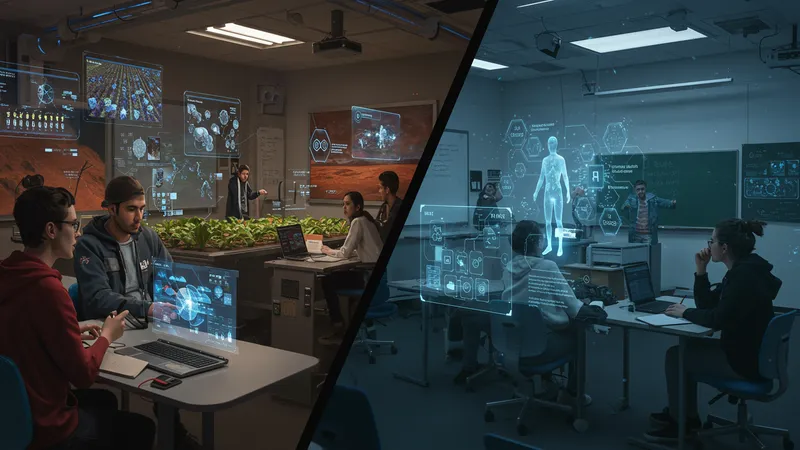
The rise of such eclectic courses is a testament to academia's adaptability and foresight. These aren't just for enrichment; they are strategic choices, intended to navigate complex societal issues and technological advancements. This shift signifies a broader educational culture change, reflecting how passion-driven learning is finally getting its due recognition. Yet, this is only part of the story.
One consequence is the emergence of "micro-degrees" and "nano-degrees" that verify expertise in these specific areas. Universities and colleges are now responding to this demand by curating specialized programs that challenge the traditional coursework setup. Such credentials are catching the eyes of companies looking for experts in burgeoning fields. But the implications extend beyond right now…
This trend hints at a paradigm shift towards more personalized and relevant education paths. As learners seek alignment with their personal values and interests, academia’s old rigidity gives way to flexible, customizable learning experiences. Delve deeper as we reveal the potential future shockwaves of this educational transformation.
Traditional degrees are being rivaled by micro-credentials—certifications in specialized skill areas that promise targeted expertise without the commitment of a full degree. Educational institutions and learners alike see these as valuable assets in a skills-first job market. Here's a surprising benefit…
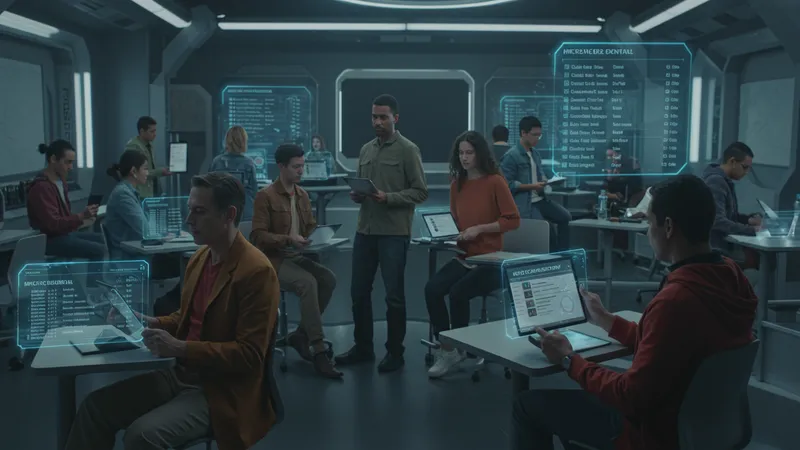
These quick, targeted learning opportunities are particularly attractive to the gig economy workforce who value agility and efficiency. Micro-credentials can be stacked over time to demonstrate continual skill improvement, offering a flexible learning path. This concept isn’t just radical—it’s redefining professional development. And there’s more to this fascinating trend.
Interestingly, industries plagued by rapid technological changes, such as IT and digital marketing, place high value on skill-specific education. Companies now recognize that traditional degree-based learning can't keep up with industry dynamism. As micro-credentials grow in legitimacy, they challenge the very format of higher education. But there’s another layer still untouched…
Major universities worldwide are integrating these credentials into their offerings, signaling an endorsement of this educational evolution. Employers increasingly view them as credible qualifiers, acknowledging them in recruitment. As this new credential approach reshapes career landscapes, anticipate further seismic shifts in academia’s future offerings.
With online learning taking precedence, the role of physical campuses is under scrutiny. What was once the cornerstone of university life is seeing an existential challenge. Some might think this spells the death of on-campus experiences. Yet, there’s a twist...
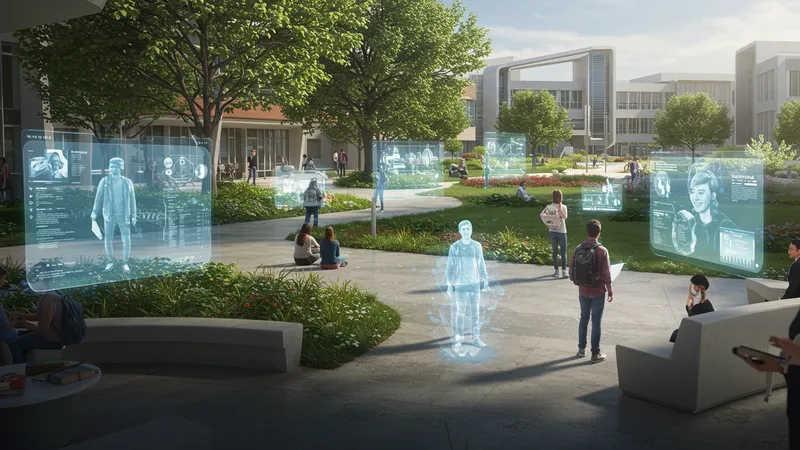
Campus life offers undeniable social and experiential benefits that no digital platform can fully replicate. Networking, social bonds, and campus culture play a crucial role in personal development. Yet universities are compelled to redefine these aspects in a digital-first world, blending on-campus benefits with remote learning ease. The real challenge lies ahead…
Forward-thinking institutions are embracing hybrid models, offering degrees that combine on-campus and online learning experiences. This dual approach isn’t a compromise—it's a chance to cater to diverse preferences and needs. However, it challenges universities to maintain the integrity and richness of traditional experiences. And therein lies the opportunity for innovation…
The digital shift requires a reimagined campus that transcends physical location constraints. The future, while uncertain, points towards an inclusive, blended educational environment that maximally leverages the strengths of both worlds. What’s more, this evolution is not just a change—it's a metamorphosis of how we perceive higher education.
The digital explosion in educational accessibility has far-reaching implications, particularly in democratizing knowledge. Distance learning platforms offer a level playing field, breaking socio-economic barriers and unlocking access to quality education. But there’s a fascinating complexity to unearth…

This movement bridges the gap for learners who might find traditional campuses out of reach, whether due to geographical, financial, or physical constraints. It empowers them with the choice to partake in elite education, reshaping demographics in classrooms worldwide. Yet, there’s a pressing challenge to address…
Despite its promise, digital education struggles with stark digital divides, where internet accessibility and affordability become significant barriers. Without equitable internet access, the goal of universal education remains elusive. However, where struggles arise, so do solutions, and the educational field is rife with possibilities…
Innovative strategies are underway to resolve these issues—community resources, governmental policies, and technological innovations seek to pave the way for true equity in education. As the barriers begin to lower, we stand on the brink of a historical shift towards genuinely accessible global education.
Never before have students wielded so much influence over the design of their educational experiences. As digital natives, they demand curriculums that reflect real-world applications and innovative teaching methods. But there’s more at stake here…
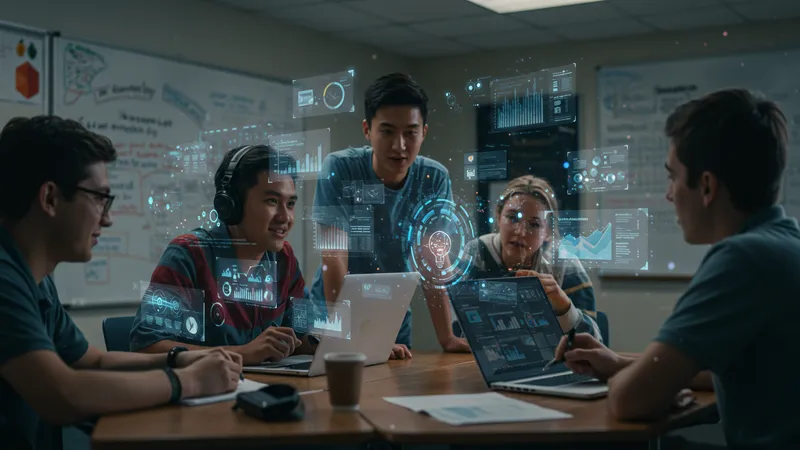
Empowered by technology, students voice their expectations for courses that align closely with market trends and personal growth objectives. Universities that heed this influence benefit from enhanced engagement and relevance. However, the power balance is not so straightforward…
The traditional notion of educators dictating curriculum comes face-to-face with a reality check—adaptability is vital. Courses now frequently undergo updates and revisions informed by student feedback and industry needs. Yet, the challenge remains to maintain academic rigor amid these shifts. There's an intriguing evolution underway…
This interactive approach has transformed students from passive recipients to active collaborators in their education. This paradigm shift promises fuller, more engaged educational experiences, aligning learning outcomes closely with future aspirations and industry demands. What comes next is more collaborative and transformative than ever imagined.
Tech innovations aren't just influencing education—they’re redefining it entirely. From AI in personalized learning paths to VR-enhanced teaching, technology is lending once-unimaginable tools to the academic sphere. But the real leap lies beyond these advancements…
These technologies transform the learning process into a more interactive and immersive experience. Students can now conduct virtual lab experiments or participate in simulations, allowing for a deeper understanding of material regardless of location. Yet, it's only scratching the surface of potential impact…
AI's role in education is expanding rapidly—from adaptive learning algorithms that cater to individual needs to chatbots that provide immediate assistance. This integration heralds a more efficient, effective educational process, albeit necessitating careful ethical and privacy considerations. But what will emerge from this technological integration? There’s more to explore…
As educators strive to harness these technologies successfully, the future signals a radically new way of teaching—one where traditional limitations fade and global classrooms emerge digitally connected. These transformative tools promise not just evolution, but revolution in education.
Education is no longer a cultural monolith. Global interconnectedness and increased mobility bring diverse cultural perspectives into the educational dialogue. But there's so much more to unpack in this cross-cultural blend…
This fusion of perspectives is enriching classroom discussions and learning experiences, fostering students who are globally aware and culturally sensitive. Yet integrating these cultural narratives into existing curriculums presents its own set of challenges. The solutions are as dynamic as the issues themselves…
Interestingly, language barriers are falling with technological translation advancements, and collaborative international projects are fostering worldwide partnerships. These interactions prepare students for future globalized workplaces, offering invaluable real-world readiness. But amidst progress, challenges linger…
The need to tread carefully, respecting cultural nuances and avoiding tokenism, is a crucial consideration. Nevertheless, as institutions embrace a global curriculum, they actively shape multifaceted, inclusive educational journeys. These are crafting not just global learners, but empathetic global citizens.
The shift towards experiential learning marks a pivotal moment in education. Traditional classroom learning strategies are being supplemented by hands-on experiences such as internships, mentoring, and live projects. But there’s a deeper value in this transition…
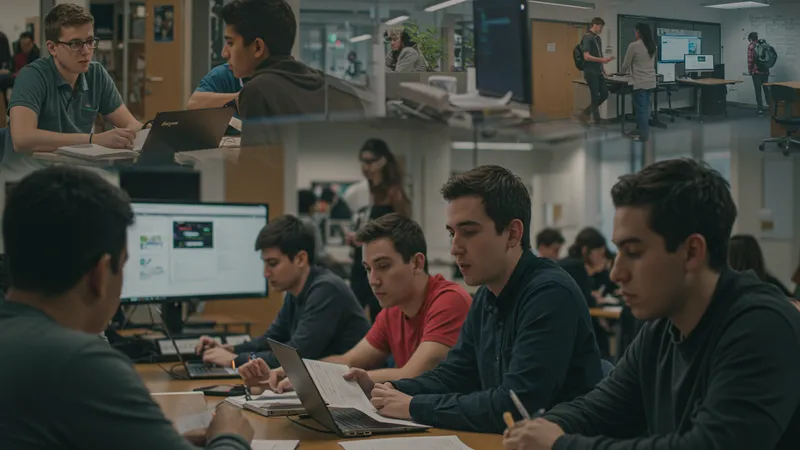
Experiential learning complements academic theories with practical applications, enhancing comprehension and retention. Programs like cooperative education embed work terms within academic programs, thus accelerating career readiness. This approach isn’t just novel—it's impactful. Yet the scenario isn’t entirely without its challenges…
One might assume such opportunities are easily accessible, but logistical barriers such as availability and equality pose concerns. Ensuring that these opportunities remain equitable and open to all students, regardless of background, remains a hurdle. But solutions are constantly evolving…
Educators and industry partners strive towards inclusive internships and rich, hands-on experiences that prepare students for dynamic professional landscapes. These initiatives ensure that experiential learning is not just a bonus, but a fundamental component of modern education, deeply embedding practical, career-relevant competencies.
Students are increasingly navigating the labyrinth of higher education through a multidisciplinary lens, eager to amalgamate knowledge from diverse fields. This modern trend embraces interconnectedness instead of compartmentalization. But there's a fascinating reason driving it…

The modern job market rewards innovators who draw from multiple disciplines to solve complex problems. Combining seemingly disjointed fields like technology and the arts can spawn creative solutions and innovations. This trend is more than just an academic curiosity—it's a necessity. Yet, there is more to it…
Balancing a curriculum that satisfies interdisciplinary inquiries while maintaining depth in each field is a challenge, provoking discussions about breadth versus depth in education. Even so, this approach paves the way for a versatile, adaptable future workforce. But this complexity is just the beginning…
Universities are adapting by launching unique programs and encouraging collaborations that break away from the silos of old. As education expands its horizons, the future offers a fertile ground for innovation and opportunity, feeding the pursuit of academic synergy and creativity.
Long seen as subservient to traditional college education, vocational training is having a renaissance. As industries face skill shortages, apprenticeships and technical training programs become increasingly appealing. But what is catalyzing this change…?
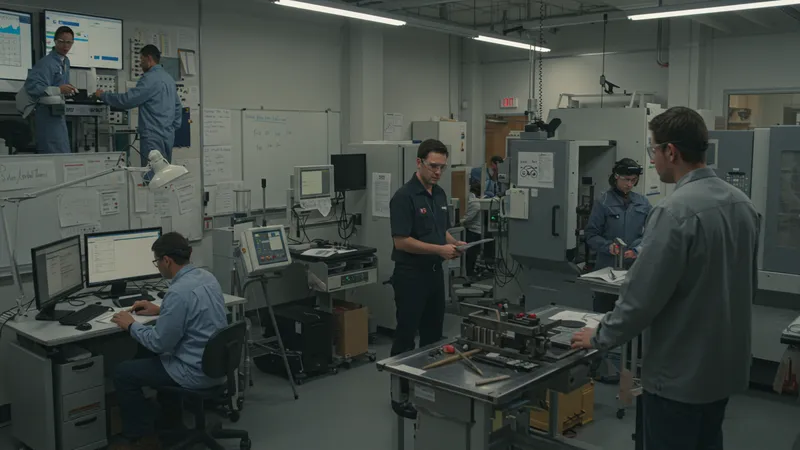
Vocational training offers direct entry into skilled trades, providing focused, pragmatic education for those who prefer hands-on approaches. It’s an oft-overlooked, lucrative pathway to high-demand careers in fields like healthcare, IT, and manufacturing. But misconceptions linger…
Some still perceive vocational routes as less prestigious; however, they promise reliable, often debt-free paths to successful careers. Changing this perception requires shifts in societal views and education policy reforms. But the vocational surge is shaking conventional wisdom…
As employers express frustration over skills gaps, they increasingly advocate for robust vocational programs. This evolving landscape elevates vocational learning as a vital component of comprehensive education, paving alternative roads to fulfillment and career success beyond university walls.
In a world pivoting towards skills and practical knowledge, the perceived value of a college degree is under scrutiny. As degrees face unprecedented competition from alternative credentials, the debate over their worth intensifies. But the real merit lies hidden…
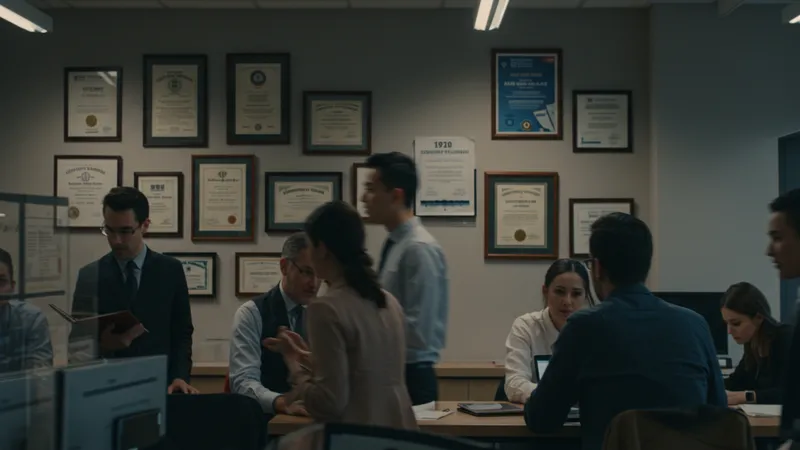
For many, degrees offer a foundational knowledge base and opportunities for personal growth and networking. Yet, these benefits are weighed against cost, time investment, and relevance in fast-evolving industries. However, unraveling this value equation reveals more nuances…
The transformative college experience, while under pressure, still holds unparalleled merits such as critical thinking development and personal enrichment. As alternatives flood the educational space, students navigate myriad options with varying returns. However, each avenue offers specific opportunities and limitations…
This ongoing discourse redefines educational values, encouraging institutions to reassess offerings and innovate to maintain relevance. As the landscape evolves, balance between traditional academic pathways and innovative alternatives holds the key to future educational success.
As we reflect on the dramatic evolution of higher education, it’s clear that the future of learning is rich with possibility and motivation for change. Students today have more pathways than ever to tailor their education to meet their passions and career aspirations. Whether embracing new technologies, flexible online platforms, or vocational opportunities, this dynamic environment is reshaping learning experiences and outcomes. Share, bookmark, and take action—embrace the new era of education that dares to balance tradition with innovation.